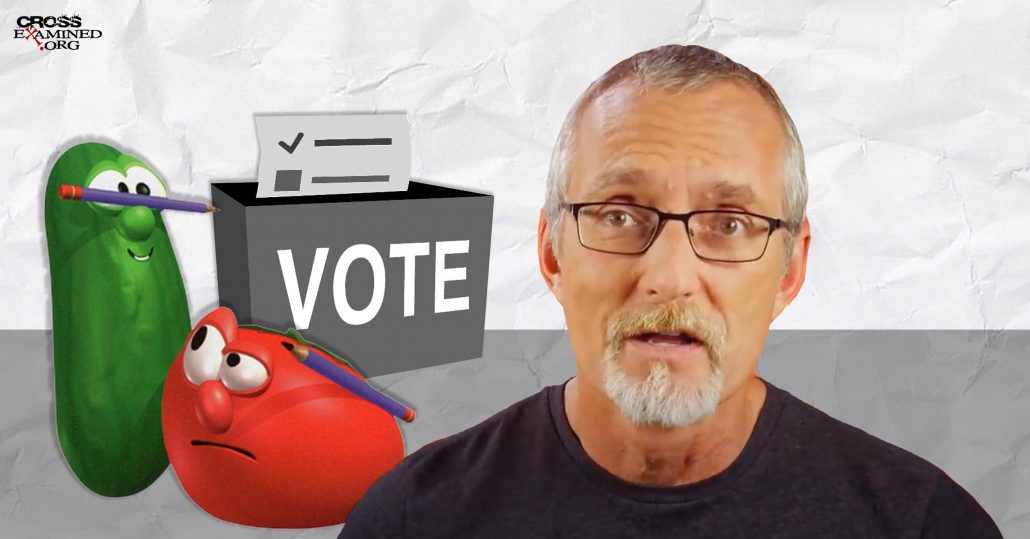How Mainstream Media Gaslights Christians (and Everyone Else Who Disagrees with Them)
I had a revelation last week that, in retrospect, was many years overdue. So overdue that it borders on embarrassing to admit this was a revelation in 2022. Here it is:
Mainstream media doesn’t try to be objective.
Now, before you laugh too hard, let me make a clear distinction: I’ve long known mainstream media is not objective. But I had strangely held onto the assumption that they thought they were being objective and just woefully lacked enough self-awareness to see how crazily biased they were.
What I realized last week is that of course they know how biased they are…whether they’ve ever stopped to acknowledge the changed nature of so-called “news” or not. We’ve simply drifted over time into a land where the unstated new normal is that virtually all news is essentially op-ed.
Perhaps the reason I naively held onto the idea that news is inherently supposed to be objective is that I started out as a broadcast journalism major in college. Way back in the ancient days of 1994, I was taking classes that presupposed every good journalist sought to be objective. Our news story homework assignments would come back to us with the finest of edits, designed to carefully root out any trace of bias. After all, if we ever wanted a shot at working for places as heralded as CNN was at the time, we had to learn how to be…unbiased.
What a crazy thought today.
Not only is mainstream media not trying to be objective, but they’re also openly advocating for specific viewpoints. And not only are they openly advocating for specific viewpoints, but they’re also strategically manipulating public thought.
Psychological manipulation over time in the search for control over people’s thinking is called gaslighting. It’s the process of making someone believe they’re crazy and question their entire view of reality.
Maybe that sounds dramatic, but I don’t think it is. There is a coordinated effort amongst mainstream media sources to achieve a specific type of public influence today—an influence directed toward achieving a uniformity of thought that’s nearly always at odds with a Christian worldview.
While Christians realize this to varying degrees, I don’t believe we’re collectively thinking enough through the implications of just how much this media sea change has affected, is affecting, and will affect both our own worldview and the worldview of those around us.
Consider the significance of the following five implicit messages that mainstream media constantly trumpets in a variety of ways.
1. “Pretty much everyone agrees with how to view issues of cultural importance. If you’re one of the ones who disagree, you’re on the extreme fringe of society. That should tell you something about the accuracy and reasonableness of your views.”
In the early 1980s, there were fifty independent companies that owned the majority of media in the US. But by 2011, just six conglomerates controlled 90 percent of media. The fact that a handful of companies control nearly all media outlets makes it possible to present a unified viewpoint on any issue. It looks to media consumers as though the “authoritative” news voices around them are all aligned with certain viewpoints, but it’s really all coming from the same handful of companies.
Make no mistake: The appearance of unified thought coming from sources people perceive to be representative of culture at large is very powerful—especially when you’re in a worldview minority. As I discuss at length in Faithfully Different, it’s estimated that only 6 percent of Americans have a biblical worldview (accepting core teachings of the Bible). Yes, 65 percent of Americans identify themselves with the label “Christian,” but the vast majority of self-identified Christians hold beliefs in conflict with basic biblical teachings about things such as the existence of objective morality, the reality of heaven and hell, the nature of God, and much more.
If you’re in the 6 percent whose worldview is based on what the Bible teaches, you’re going to feel the pressure of seeing that nearly everyone in culture—including those who identify as a Christian—thinks differently. And media wants to capitalize on that aspect of our humanity that makes us question our beliefs just because they differ from the norm. But remember: There’s no such thing as democracy when it comes to what’s true about reality; numbers will never determine truth.
2. “Here’s the language that’s acceptable to use if you’re going to be an acceptable member of society.”
Beyond the uniformity of viewpoint achievable due to the structure of media ownership, there’s uniformity even at the detailed level of language. That’s because there’s a language guide that has long functioned as the default style manual for mainstream news organizations. It’s called the Associated Press (AP) Stylebook.
The AP Stylebook goes far beyond what words everyone should capitalize in a headline or when to hyphenate; they give viewpoint guidance as well. They recently issued, for example, a guide for coverage on transgender issues.
Ironically, the guide begins, “Journalists on all beats must be able to write about and interview transgender people using accurate, sensitive, unbiased language.” But what follows is anything but unbiased. As a small sampling of the guide, media is told to:
- adopt the language “sex assigned at birth” rather than something like “birth gender” or “born a girl,” presumably to emphasize how arbitrary the sex “assignment” decision is;
- describe a transgender person using phrasing such as “is a woman” rather than “identifies as a woman,” presumably to emphasize the certainty of a person’s new identity;
- avoid terms like “biological male,” which they say are used by “opponents of transgender rights” to “oversimplify sex and gender”; and
- not use phrasing that “misgenders people or implies doubt, such as former men’s swimmer or currently competes as a woman.”
And that’s just a small fraction of the content. It’s very clear that journalistic expectations now include using language in a way that accepts and promotes the mainstream secular narrative. The more the public hears carefully curated phrasing designed to subconsciously transform how we view issues, the more those who refuse to use such language will be viewed with resentment. Once again, the idea is that this is where society at large is, and if you’re not there with your words, there’s something wrong with you.
(If you’ve marveled at how mainstream media can euphemistically refer to the intentional killing of preborn babies as “abortion care,” this is the same strategy at work. Transform the language, and you’ll transform how people think.)
3. “These are the subjects that are most important to know about and discuss.”
Every day, thousands and thousands of editorial decisions are made as to what makes the news. In other words, before we even get to the bias in how stories are told, we have the bias of what subjects are even selected to tell.
One study, for example, showed that the major broadcast networks gave three times more airtime to the pro-choice Women’s March than to the pro-life March for Life, despite comparable participant numbers and location. If you had been watching these networks, it would have been easy to assume that the pro-choice Women’s March was far more culturally significant, even if that wasn’t necessarily the case.
I regularly visit the Facebook news tab to track this phenomenon and see what they’re pushing users to consider important. From the looks of it, they really want me to be aware when a celebrity changes pronouns (Demi Lovato this week), when new state abortion restrictions have (allegedly) jeopardized a woman’s health, and that Christian nationalism is a terrifying threat.
Story selection strongly shapes our view of what the “world” is talking about, and that can significantly influence what we believe is most important if we’re not careful. But there are plenty of issues important for Christians that you’ll rarely see discussed in mainstream media. Wins for religious freedom, for example, will likely not see the light of day, or if they do, they’ll be covered negatively. Christians need to take it upon ourselves to stay informed about issues mainstream media won’t discuss.
(For religious freedom issues in particular, I highly recommend following the Alliance Defending Freedom.)
4. “These are the things you need to be very afraid of…and the solutions that will make you safe again.”
Whether it’s Covid, monkeypox, climate change, the loss of supposed “abortion rights,” or the idea that the world is one step from nuclear annihilation, continually perpetuating fear drives ratings and clicks. Frankly, that’s just business. It’s how they make money. But fear is also undoubtedly used strategically to push people to favor desired solutions.
This is a tactic that works with just about anyone—Christian or not—because it speaks to our human nature. We just have to be self-aware enough to recognize it.
When people are scared for themselves, they’re more likely to hand over freedoms to the government to ensure some measure of safety. But the bigger the government control in the name of safety for all, the lesser the tolerance and rights for any who won’t fall in line.
And when people are scared for others, they’re more likely to accept positions that might otherwise be at odds with their own moral knowledge. I’ve read countless comments from Christians, for example, who are afraid to take a stand against so-called gender affirmation surgeries for teens because they’ve been told teens will commit suicide if they aren’t affirmed in a chosen gender. Media sees what fear can drive and continually perpetuates those statistics to sway views. (Abigail Shrier’s book Irreversible Damage: The Transgender Craze Seducing Our Daughters is a must-read on this subject.)
Similarly, many Christians claim to be pro-life personally but don’t support banning abortion because media has made them fear that abortion bans will be responsible for women dying from situations like ectopic pregnancies (this is completely false.)
When people are scared, whether for themselves or others, it gives media a reason to take the presumed moral high ground and demonize anyone who doesn’t support safety. That’s effective because now you’re not someone who simply disagrees—you’re someone who is putting others in either mental or physical jeopardy. Christians on the receiving end of that characterization need to be deeply convicted of the biblical justification for their positions in order to not feel the psychological weight of thinking their views actually hurt others.
(And for the record, I’m not saying that there aren’t things to be legitimately concerned about. I’m specifically talking about how the media elevates appropriate levels of concern to a point where they can leverage crisis-level fear to their benefit and agenda.)
5. “It’s not just us saying these things…look at all these Christian leaders who agree. Trust them even if you don’t trust us.”
Someone not following the news closely might think that Christians are actually well represented in the media. After all, mainstream outlets somewhat regularly feature interviews with or articles about various Christian leaders. CNN, for example, recently featured a lengthy interview with high profile pastor Andy Stanley titled “The evangelical church faces a ‘state of emergency’ over the pandemic and politics, Andy Stanley says.”
But of course CNN was pleased to publish an interview with a well-known pastor criticizing the evangelical church and scolding Christians for taking sides in politics. That’s what they’d like to do themselves, but it’s more effective to have one of our own say it in the hope we’ll question any differing understanding we may have. (The interview was based on Stanley’s new best-selling book, Not In It To Win It: Why Choosing Sides Sidelines the Church, which I discussed the problems with in my last podcast— “Why Christians Must Care about Politics.”)
Similarly, The Washington Post is happy this week to feature the headline, “Clerics sue over Florida abortion law, saying it violates religious freedom.” Of course, they’re going for the shock value of suggesting religious leaders are for abortion as much as anyone else and that it’s actually a matter of religious freedom.
Any Christian writer/speaker/pastor whom mainstream media is happy to feature should take deep stock of why they’re receiving an invitation to the party. It’s not because media wants to genuinely share a Christian view that differs from the norm. It’s almost certainly because your view doesn’t differ from the norm that they want to promote your voice as an example to all those “other” Christians. And if your view doesn’t differ from the norm, it’s probably a good time to consider if the media has already done a really good job of convincing you to think like them.
The other day, my son and I drove by a used bookstore in town, and he noted the sign posted in the front: “Browse books and exchange ideas.” He jokingly said, “That might be the last place for the free sharing of ideas in America.” We laughed at the thought that the final outpost for the welcome exchange of differing views might be this tiny bookstore in our town. But the way mainstream media functions today, it’s not far from the truth that the open exchange of ideas will have to happen in places people very intentionally seek out.
Recommended resources related to the topic:
Stealing From God by Dr. Frank Turek (Book, 10-Part DVD Set, STUDENT Study Guide, TEACHER Study Guide)
Counter Culture Christian: Is the Bible True? by Frank Turek (Mp3), (Mp4), and (DVD)
_____________________________________________________________________________________________________________________________________________________
Natasha Crain is a blogger, author, and national speaker who is passionate about equipping Christian parents to raise their kids with an understanding of how to make a case for and defend their faith in an increasingly secular world. She is the author of two apologetics books for parents: Talking with Your Kids about God (2017) and Keeping Your Kids on God’s Side (2016). Natasha has an MBA in marketing and statistics from UCLA and a certificate in Christian apologetics from Biola University. A former marketing executive and adjunct professor, she lives in Southern California with her husband and three children.
Original Blog Source: https://bit.ly/3TIdZuj











